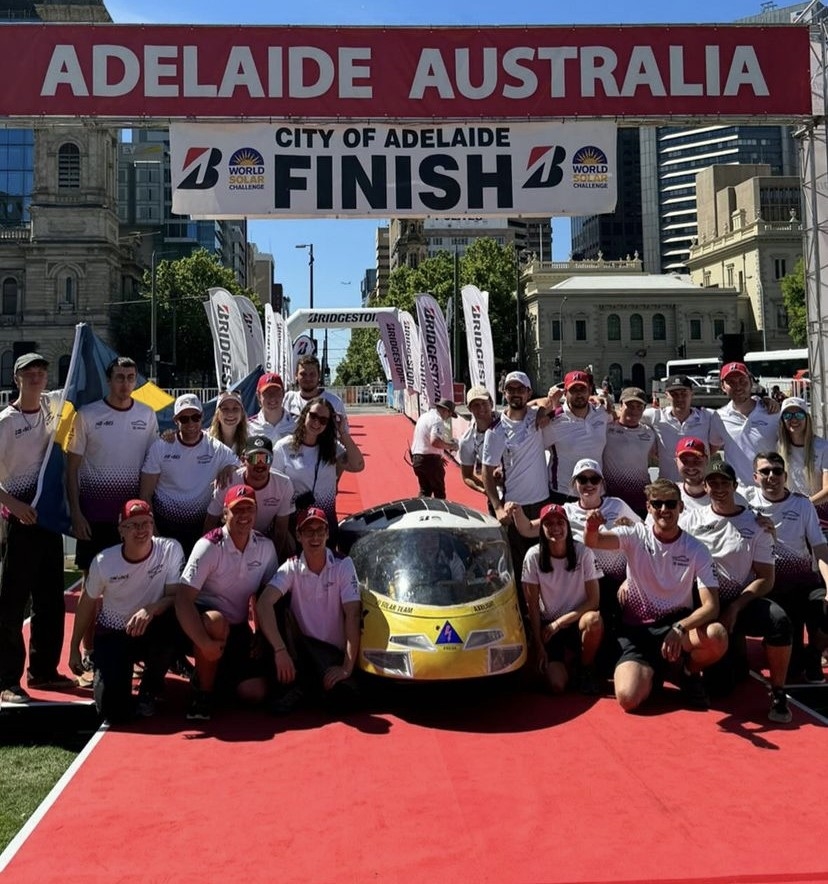JU Solar Team better than ever in World Solar Challenge

JU Solar Team at the finish line of the Bridgestone World Solar Challenge in Adelaide. Photo: Bridgestone World Solar Challenge.
JU Solar Team was the best Swedish team in the Bridgestone World Solar Challenge in Australia. The team, which consists of students from Jönköping University (JU), came in seventh place, which is their best result so far in the competition.
"Our team did very well in the competition, which was fun to see and made me proud as a representative of JU," says Ingrid Wadskog, Managing Director and Dean of the School of Engineering (JTH) at JU.
She accompanied JU Solar Team on their way through Australia and has been part of the team's service team. Their average speed for the entire race was 65.2 km/h and they finished at around 06:00 (Swedish time) on 27 October. Innoptus Solar Team from Belgium won the competition, maintaining an average speed of 88.2 km/h.
"Worked incredibly hard"
Ingrid Wadskog, describes the competition as an incredible challenge and that JU Solar Team has worked hard in 35-degree heat and that some of them were up all night to get all the electronics, mechanics and all the solar panels working.
"All the time, new complications and problems appeared that the students had to solve. When the competition started on Sunday, it struck me how far and how fast the car had to drive to meet the time requirements in the competition. All this was done among the normal traffic on the roads, says Ingrid Wadskog.
"Half of the solar cars made it to the finish line"
The Bridgestone World Solar Challenge runs from Darwin in the north to Adelaide in the south, which is a distance of 302.2 miles. About 30 teams started on 22 October, but only around half of them made it all the way to the finish line. The JU Solar Team drove 60 miles on the first day on a fully charged battery. Then the strategy work began with driving just enough fast so that the battery had time to charge while driving.
"We had some problems with the solar panel and the transfer to the battery the first few days. The students solved it by troubleshooting in the evenings when we had stopped to camp. So day three everything worked as it should. Then came other challenges in the form of forest fires and extreme heat, which also affected the battery charge, says Ingrid Wadskog.
Had to puncture a tire
The last mile Before the final day of competition, the JU Solar Team camped in the same location as a Japanese team, that had a two-minute lead on them. However, the JU Solar Team drove fast on the final stretch, overtook the Japanese team and extended the lead to them over the final 35 miles. To make it extra dramatic, the JU Solar Team had to puncture a tire with only a few miles to go. 1.5 miles from the finish they stopped and did a quick tire change in just 3.5 minutes and thanks to that they were able to keep the lead and finish in seventh place, about 15 minutes ahead of the Japanese team.
"Fantastic engagement"
"The students have faced all the challenges with both the car and the competition in a great way. Just camping in a tent from 40 degree heat on the first night to plus seven degrees on the last night was an experience. Compared to the top teams in the competition, we probably have a fifth of their budget and fewer people in our team. So the commitment of our students and teachers in the solar car project is absolutely fantastic. They have built a car that really stands up to the top teams. Right now I am mostly happy and grateful that everything went well. I am proud of the performance of the team and tired from a very intense journey. Even we in the service team have had to work hard, says Ingrid Wadskog.
The other Swedish universities that participated in the competition were Chalmers and Halmstad University. Read more about the Bridgestone World Solar Challenge here External link, opens in new window.
The text will be updated.


